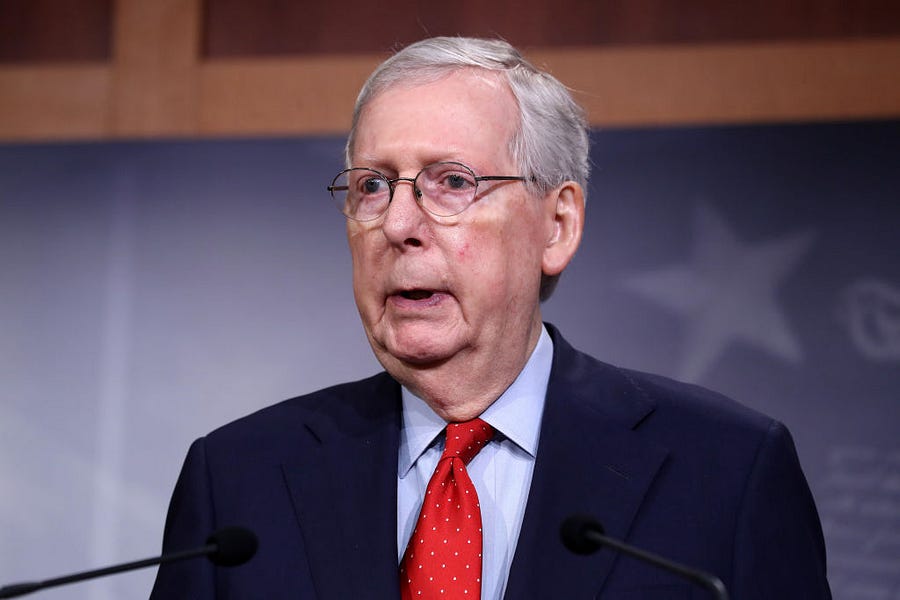Amy Coney Barrett makes three. Three Supreme Court justices and 220 judicial appointments in all. Regardless of your ideological commitments, it’s a monumental achievement. And if “judges” was your overriding reason to vote for Donald Trump in 2016, it’s hard to argue with the claim that your decision was vindicated.
But ask anyone in Washington who knows anything about how Washington actually works, they will tell you that while Trump’s election was necessary, it was not sufficient. The indispensable man in this regard, and perhaps of the Trump presidency, was Mitch McConnell.
Starting with his decision to refuse consideration of Obama’s nominee to replace Antonin Scalia, Merrick Garland, McConnell has been the decisive factor. That one decision arguably—I would say, probably—got Trump elected.
Of course, as I often note, Trump’s victory was so narrow that any factor that attracted even a statistically tiny number of Trump-reluctant voters can be credited with his victory.
Mathematically, if only the people who were excited about voting for Trump had cast ballots for him in 2016, he would have lost. Remember: 7 percent of Trump voters told Pew that they would be disappointed if their candidate won. So you can point to Jim Comey’s press conference, or to Hillary’s refusal to campaign in places—most famously, Wisconsin—as the decisive factor. Heck, weather alone could explain it.
But holding all those other things constant, I think Trump’s decision to outsource his list of nominees to the Federalist Society and the Heritage Foundation was essential to putting together a coalition that could pick the lock on the Electoral College. Of voters who said the Supreme Court was “the most important factor” in their decision, 56 percent voted for Trump. Meanwhile, 26 percent of Trump voters surveyed by the Washington Post said that the Supreme Court was the basis of their decision. I don’t think the real number is that high, but even if it was a tenth of that, it would mean the Supreme Court won the presidency for Trump.
And if Mitch McConnell hadn’t made the decision he did on Garland—whether you think it was outrageous or courageous—Trump would have lost.
And yet for the first two years of Trump’s presidency, McConnell was Public Enemy No. 1 in MAGA World.
Night after night, Lou Dobbs, Sean Hannity, and the rest hammered McConnell as a Deep State stooge, an establishment fossil, an indefensible obstructionist of the glorious MAGA agenda. “So, Sen. McConnell, my message to you, if all you’re going to do is whine like a 10-year-old and complain and make excuses and blame the president for your failure after eight months of him now being in office and you having the House and Senate, guess what, it really is time to drain the sewer and swamp,” proclaimed Hannity in one typical jeremiad.
“The fact of the matter is, McConnell and [Paul] Ryan—they look like troglodytes that somehow have survived eons, and they have, if you will, been Darwined [sic] out, but just they and the conference don’t realize it,” explained Lou Dobbs. Hating McConnell became the organizing principle of Breitbart.
But no one was more committed to destroying McConnell than Steve Bannon. He told the New York Times in 2017, “Mitch McConnell has to go.” When asked whether McConnell would be majority leader in 2018, Bannon replied, “I absolutely do not think he will be majority leader. … It’s not my personal mission, but it’s an objective. … And I believe it’ll be done before this time next year.”
At this point the narrator should have intruded to say, “Actually, it was his personal mission.” Bannon soon organized primary challenges to every single Republican senator (except for Ted Cruz—who, by the way, famously refused to endorse Trump in 2016) in an explicit attempt to strip McConnell of the majority leader job. He cobbled together a ragtag cadre of MAGA gargoyles to take out incumbent Republican senators (as well as some House candidates, including the anti-Semite goon Paul Nehlen, who lost to Paul Ryan by 70 points). The most (in)famous of these candidates was Alabama crank and mall-cruiser Roy Moore. To McConnell’s credit, he made it clear that even if Moore won, he would be shunned by the party.
Bannon’s failure was as complete as McConnell’s success.
Governance is for grownups.
McConnell has his critics, and some make perfectly defensible points. But here’s what I admire about McConnell: He’s a grownup and an institutionalist. The two things go together. It will win me no points with populists to say this, but populism often manifests itself as childishness. “Childish” has a slightly different connotation than “childlike.” Childlike conveys sweetness and innocence. Childishness is defined by a refusal to accept the rules. Childish people are quick to take offense. They are the Veruca Salts of the world, who want it now. They don’t care about the rules, and they think manners are for other people. They are reluctant to listen and eager to shout. Childish pranks are their own reward, and consequences for their actions are always unfair. Grownups think about consequences. They remember mistakes and adjust for them.
Children think serious arguments are unfair obstacles to wish fulfilment. As the great populist William Jennings Bryan said, “The people of Nebraska are for free silver, so I am for free silver. I will look up the arguments later.”
McConnell is a rare creature in Washington, particularly in the Senate: a man who isn’t president and doesn’t want to be. He is where he wants to be. Sure, he is an ideological conservative, but he’s also an institutional one. He opposed campaign finance reform because he believed it would damage the political system—and he was right. He opposed Harry Reid’s lifting of the judicial filibuster for non-Supreme Court nominees because he believed it would damage the Senate—and he was right. You can argue that his decision to escalate the practice was wrong, but only if you subscribe to the childish notion that Democrats are allowed to change the rules without consequence. McConnell warned Reid that there would be consequences for Reid’s decision and, like a grownup, he was true to his word.
It’s a talking point of the left that McConnell is just another Trump supplicant who does the president’s bidding. This nonsense overlooks the fact that the primary reason the MAGA right hated him—other than his reluctance to spout flattery in Trump’s direction—was his refusal to abolish the legislative filibuster. As both a grownup and an institutionalist, he understood that the “I want it now” caucus has all the foresight we associate with children. He knew that Democrats would be back in power again, and the cost of abolishing the filibuster for some short-term “win” for Trump would guarantee far greater losses in the future. Politics is often called “the art of the possible,” and that’s McConnell’s métier. Yes, he looks like a tortoise, but the tortoise won the race because the childish rabbit lacked foresight.
The inestimable Kevin Williamson writes:
One of the many perversities of Trump’s presidency is that Donald J. Trump’s core deficiencies as a chief administrator—his ignorance and his laziness—are the chief practical virtues of his presidency. He doesn’t know what he doesn’t know and doesn’t want to know, and this has created the opportunity for some of the people in his administration to get some useful things done. For this reason, the conservative advances that have accompanied the Trump presidency (and it won’t do to pretend that these do not exist) mostly have been in the fields in which the president has the least engagement and interest, whereas the catastrophes of the Trump presidency (and it won’t do to pretend that these do not exist) are strongly associated with those few areas of policy in which he takes an active interest or is personally and strongly engaged with ex officio.
Kevin goes on to note that perhaps the best illustration of this has been Trump’s utter disregard for the Constitution. “Trump’s principal success has been as a rubber stamp to the very ‘establishment’ at which Trump and his admirers like to sneer.”
This is a point I’ve hammered for years now. Trump believes his best friends are the ones who lavish him with praise and celebrate his biggest mistakes as brilliant victories. But, from the vantage point of history, his best friends are the conservatives who constrained him—or simply ignored him—to get important things done. In the summer of 2016, Trump was talking about his steadfast support for “Article 12” of the Constitution and boasting that he might put his sister on the Supreme Court. Some grownup somehow convinced him that this could cost him the election. So he had to persuade voters that he would substitute a serious group’s judgement for his own. But it was only because he never cared about the conservative legal movement that he was perfectly happy to outsource judicial appointments to people who do.
I shudder to think what kind of judges we’d have if Trump felt as invested in who sits on the bench as he is about who sits in the attorney general’s chair.
If Trump had outsourced the pandemic to the experts in his own administration as if it were a medical Federalist Society, he might well be poised for re-election (every governor, Democrat or Republican, and virtually every foreign leader, liberal or conservative, who took the pandemic seriously benefitted in the polls). But the appeal of “free media” to childishly perform during COVID press conferences was too seductive, and the allure of fighting his own medical “establishment” was too great.
What amazes me is how so many of the people who rail against “the establishment” for all of Trump’s failures always place blame at the feet of the “establishment” but assign credit for all of the “establishment’s” successes in Trump’s column. The Federalist Society, Heritage, and McConnell handled the judges, but Trump gets the laurels. Trump took the ball from Fauci and Birx, but it’s their fault Trump scored in the wrong end zone.
There are conservatives—and people who merely claim to be conservative—who so detest Donald Trump that they think the entire GOP should be “burned to the ground.” I certainly understand the detestation, and I definitely think a price should be paid (and it looks like it will be). But letting your passion run roughshod over reason is itself a form of populist childishness. McConnell didn’t want Trump to become president. But grownups adjust to reality when they don’t get what they want. That’s what McConnell did. He said “No” to Trump when he could, and when he thought he should. You can defensibly complain that he should have and could have done it more. But at a moment when Gaetzian childishness is the reigning definition of ideological purity, I am grateful for what few grownups are left in the room.
Photograph by Chip Somodevilla/Getty Images.







Please note that we at The Dispatch hold ourselves, our work, and our commenters to a higher standard than other places on the internet. We welcome comments that foster genuine debate or discussion—including comments critical of us or our work—but responses that include ad hominem attacks on fellow Dispatch members or are intended to stoke fear and anger may be moderated.
You are currently using a limited time guest pass and do not have access to commenting. Consider subscribing to join the conversation.
With your membership, you only have the ability to comment on The Morning Dispatch articles. Consider upgrading to join the conversation everywhere.